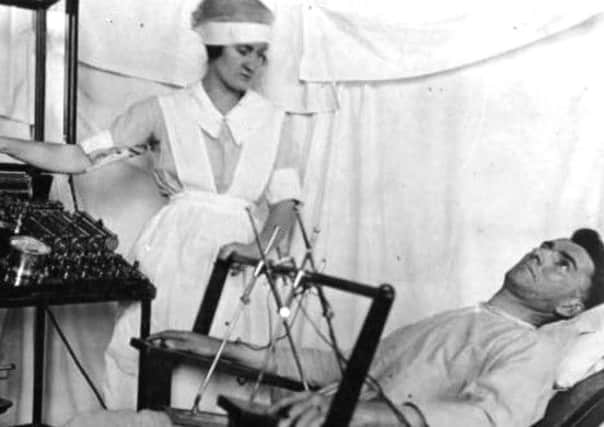Devastating impact of ‘shell shock’


TODAY, we are familiar with the phrase “post traumatic stress.”
It is synonymous with anything from terrorist attacks to car accidents and it can have dreadful and debilitating effects including nightmares, paralysis and insomnia.
Advertisement
Hide AdAdvertisement
Hide AdDuring the Great War there was a similar psychological condition that became known as “shell shock” and in her new book, Shell Shocked Britain, Suzie Grogan charts the impact it had and the legacy it left behind.
According to official records, shell shock afflicted 80,000 people during the war in Britain but Grogan believes the true figure was far higher.
“It’s a huge under-estimate because those with physical wounds weren’t included. You also had many more people who suffered breakdowns after the war, as well as civilians on the home front who endured air raids. The whole country was shaken to its foundations and it could have affected more than 500,000 people.”
Shell shock can be traced back thousands of years, but the stress of conflict wasn’t recognised as an illness in Britain before the onset of the Great War. “To break down was seen as a sign of weakness and it affected the working classes, too, because you had things like the Scout ethic which was based around being heroic and doing your duty.”
Advertisement
Hide AdAdvertisement
Hide AdHowever, problems arose when this “stiff upper lip” mentality came up against the brutality of modern warfare, which created a different kind of response in people that hadn’t been seen to the same extent. People often assume that shell shock was caused by the deafening sound of explosions going on all the time, but Grogan says that was just one aspect of it.
“It wasn’t just about shells exploding within earshot. There were long periods of boredom for soldiers which gave them time to think about their imminent death, or their best friend who they’d seen blown to pieces, and this was a big factor, too.”
At the start of the war shell shock was also seen as a physiological, rather than pyschological, issue. “Charles Myers came up with the term and it was used to describe a loud shock that caused ringing in the ears. But it started to effect men who weren’t near exploding shells which showed that it was actually a psychological condition.”
The treatment for those suffering from shell shock veered wildly. In some cases it was horrific and represents a dark chapter in our medical history. “It depended which doctor you got,” says Grogan. “We talk about a postcode lottery today but it wasn’t even that sophisticated.”
Advertisement
Hide AdAdvertisement
Hide AdThere were some progressive doctors, like William Rivers who famously treated Siegfried Sassoon, who got patients to talk about their experiences and feelings, something that we now know works and is entrenched in modern mental health treatment.
Others weren’t so fortunate. “Some doctors used a technique called faradization and applied electric currents to the part of the body, like the tongue, that were affected, until they got some response.”
Victims sometimes ended up in asylums hundreds of miles away from their families. “Some of them would be there for years and there were some who were still there at the outbreak of the Second World War.”
But as Grogan points out, doctors were under pressure themselves. “Their job was to get men back to the front and it’s easy to blame the generals, too, but they were all trying to deal with a situation they hadn’t faced before.”
Advertisement
Hide AdAdvertisement
Hide Ad* Shell Shocked Britain - The First World War’s Legacy for Britain’s Mental Health is published by Pen and Sword, priced £19.99. Suzie Grogan is appearing at Waterstones, Leeds, this Wednesday at 7pm. It is a free event, for details call 0113 237 9900.